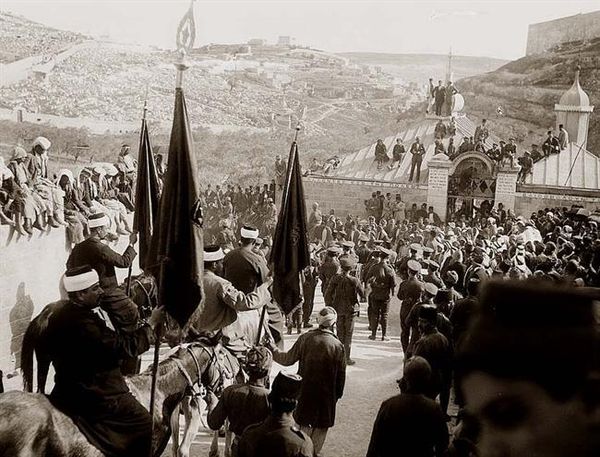When tracking the Palestinian national identity, one must not conflate the individual vs. collective. The connecting tissue from the various individuals, whether Christian or Muslim, was rejection of Jewish Zionist immigration to Palestine and the establishment of Israel.
Individual attempts by Beiruti Christians at constructing a distinct Palestinian identity are exemplified by Maronite Nagib Azouri.
His “Le réveil de la nation arabe”, in 1905, remains perhaps the most famous articulation of “Palestinian” identity.
His “Le réveil de la nation arabe”, in 1905, remains perhaps the most famous articulation of “Palestinian” identity.
It was an individual effort, not a collective one, by a Christian who feared Muslim domination, producing at best an antisemitic screed rather than a coherent national “Palestinian” project, and one that had no traction among Muslims who saw themselves collectively as Muslims.
Le réveil included a comprehensive discussion of the relationships between the Ottoman Empire and the world powers. Most significantly, Azoury openly urged the Arab provinces to sever their ties with the Ottoman Empire.
In addition to the text's nationalistic nature, Le réveil exhibited antizionist sentiment and decried Zionist aspirations in Palestine. The book apparently was not initially influential among Arabs, but it did spark dialogue in Europe and especially in France.
Khalil Beidas was also a notable Christian Lebanese voice. Beidas was one of Palestine's foremost intellectuals in the early 20th century. His work played an important role in the construction of a Palestinian national identity with regard to Jewish migration to Palestine.
His first literary venture into this genre was al—Warith (The Inheritor/The heir) in 1920. The book dealt with the partition of Palestine and the creation of the state of Israel, which appeared only occasionally down to 1948.
In this work, a Jew gets rich via usury and decent people are exploited. It is one of the two Palestinian novels of note written before 1948. Given his strong connections with the Russian Orthodox Church, Beidas became a leading member of Palestine's Orthodox church.
During the Nebi Musa riots, 1920, a protest against Zionist immigration into Palestine, Beidas was one of the key speakers, credited with giving a 'soul-stirring speech'. It was thought to be incendiary: the crowd responded by chanting 'we will drink the blood of the Jews'.
The 1920 Nebi Musa riots took place in British-controlled part of Occupied Enemy Territory Administration between Sunday, 4 and Wednesday, 7 April 1920 in and around the Old City of Jerusalem. Five Jews and four Arabs were killed, and several hundred were injured.
The two leading so-called “Palestinian national figures” who led the charge against the Zionist project did so by appealing to religious (Muslim) NOT national (“Palestinian”) sentiment. Mufti Hajj Amin al-Husseini & cleric Izzeddin al-Qassam.
The Muslims of the Ottoman Vilayets of Beirut & Damascus, later The British Mandate, had no reason to develop a national narrative & advocate for a national identity; they lived what Prof. Amal Jamal termed “a banality of being”; they were Muslim subjects of a Muslim Empire.
The Muslims’ and Arabs’ response to the Zionist project was not a coherent “collective” Palestinian one as such, but indeed a distinctly Muslim one, with individual fitful disorganized pockets of “Christian Palestinianisms” and “Arabism” that had no traction among Muslims.
Rachid Khalidi was too cautious a historian to call the Muslims’s response to Zionism a national Palestinian one. There was no distinctly Palestinian national consciousness to speak of, he admits, before the Jews relinquished the term ”Palestine” in favor of “Israel.”
Khalidi notes the rift among Arabs in the early 20th century between the rural Fellahin & their absentee landlords who were largely Beiruti/Damascene land owners. The notables of Jaffa, Nablus, Jerusalem, were educated in Istanbul & their sentiments were Ottoman, not Palestinian
In the 1920s-30s their wager was on the Muslim Umma, & in some circles “Arab” NOT Palestinian sentiment. Still the Palestine that Arabists and Arab-Palestinians trot out today remains a Christian European invention.
As for “Jund Filastin”, a Muslim garrison town wrested by Muslim conquerors from the Byzantines, it has nothing to do with British Mandate Palestine, neither conceptually nor geographically or historically. Suggesting that it does is plain intellectual vandalism.
None of the media, even medieval Arab historians refer to a conquest of Filastin— the general term for those early Byzantine campaigns being “Futuh al-Sham”, literally the “northern conquests.” The term “sham” later evolving to mean what Arabs understand to be Syria today.
Jund Filastin has no political, national, or administrative significance, but instead a geographic one—a large province composed of several districts none of which was called Filastin, except the subdistrict/garrison Jund.
The most clear, cohesive, and collective national identity of Palestinians came post the establishment of Israel, and largely led by Yasser Arafat, from Fatah, a paramilitary organization seeking the disestablishment of Israel and its replacement with a Palestinian state, & PLO.
* acknowledgment for Franck Salameh, who wrote a previous thread I used here.

 Read on Twitter
Read on Twitter


